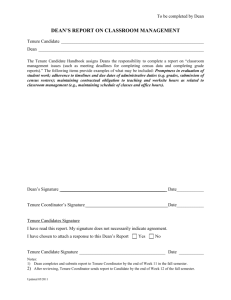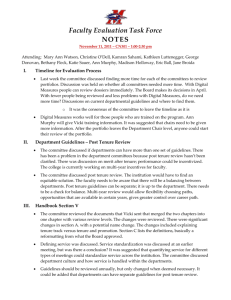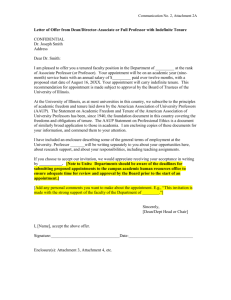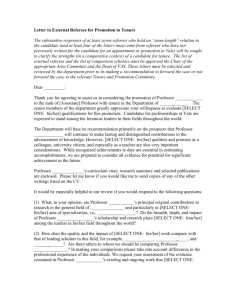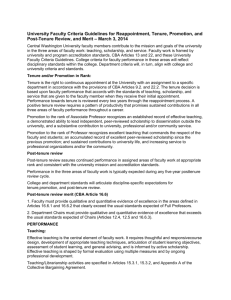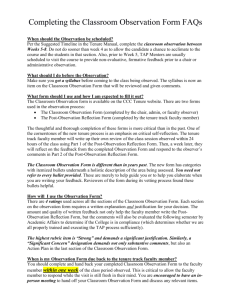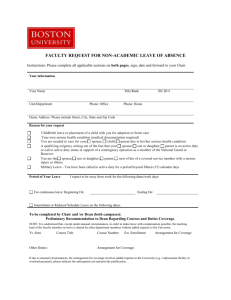CB Guidelines - Central Washington University
advertisement
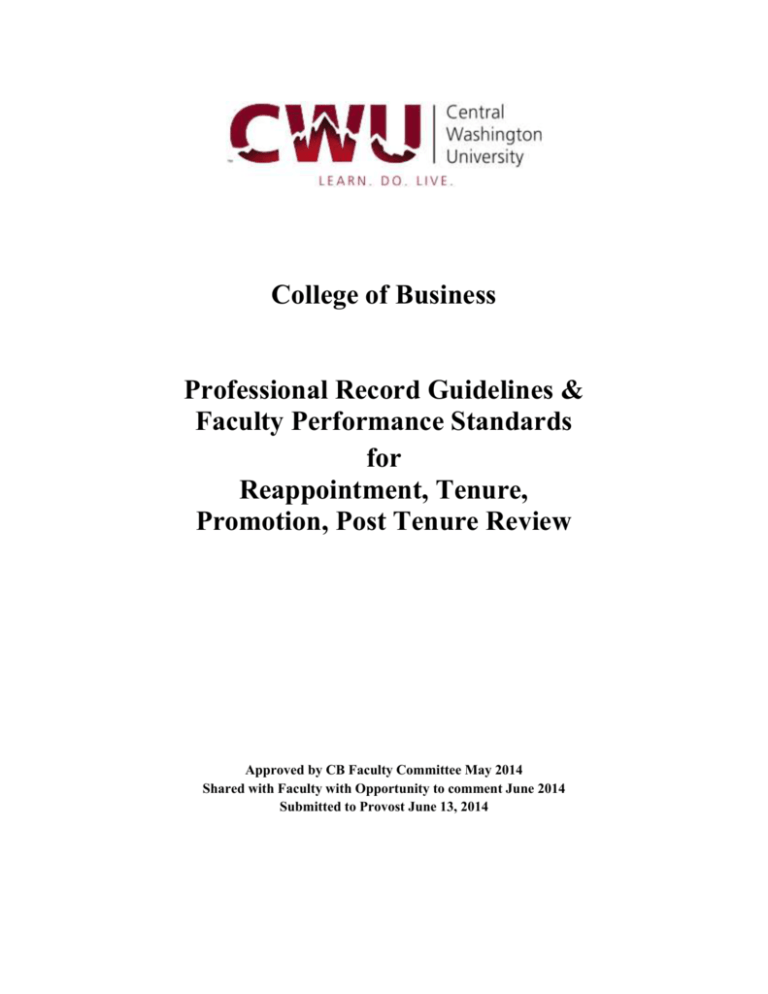
College of Business Professional Record Guidelines & Faculty Performance Standards for Reappointment, Tenure, Promotion, Post Tenure Review Approved by CB Faculty Committee May 2014 Shared with Faculty with Opportunity to comment June 2014 Submitted to Provost June 13, 2014 College of Business Faculty Performance Standards For Reappointment, Tenure, Promotion, and Post-Tenure Review College of Business faculty members create value and opportunity for our students by focusing on quality in undergraduate education. We accomplish this through emphasis on excellence in teaching, which is strengthened by faculty research and supported by professional service. To this end, both the University and CB recognize the accomplishments of tenured and tenure-track faculty members in the areas of teaching, scholarship and service. Faculty work is framed by missions of the university and of the College, and AACSB accreditation standards. Additionally, Section 22.4 of the CWU/UFC 2013-2017 CBA states, “The Professional Record shall be the basis for evaluation at all levels of review. It is the responsibility of the individual faculty member to make sure that the Professional Record is complete at the time of submission to the dean. Professional Records will contain a current CV, workload plans, annual faculty activities reports, performance evaluations, SEOIs, evaluation letters from prior evaluation periods, and any additional materials required by departments. Other material reflective of a faculty member’s teaching, scholarship, or service may be included at the faculty member’s discretion (e.g., peer evaluation letters, copies of papers/abstracts).” The professional record is submitted to the department chair in compliance with Section 22.6.1 of the CWU/UFC CBA, which states that, “Candidates for any one of these processes [reappointment, promotion, tenure, and post-tenure review] must submit an updated, complete Professional Record, to the department chair, according to the dates specified by the academic calendar. The file will be considered a working file while under review by the department. Updated information on the change in status of any listed item or activity may be forwarded to the chair for inclusion in the file.” The College of Business criteria for faculty performance is presented in the following sections of this document. These standards align with the University Faculty Criteria Guidelines and CBA Articles 9.2, 16.6 and 22.2. Since the College is relatively small in terms of the number of faculty, students, and departments, its disciplines are related and connected, and its professional accreditor’s focus is the college not the department, the College has one set of performance criteria that apply to all of its departments. I. GENERAL PERFORMANCE CRITERIA FOR EACH LEVEL OF REVIEW A. Reappointment Performance toward tenure and promotion is reviewed through the reappointment process, as defined in the CBA Article 22. Probationary faculty are reappointed when they demonstrate a pattern of development in the areas of teaching, scholarship and creative activity, and service that indicates they are making clear progress toward tenure. For the reappointment evaluation cycle, see CBA 22.2.1. B. Tenure and/or Promotion in Rank Tenure is the right to continuous appointment at the University with an assignment to a specific department in accordance with the provisions of CBA Article 9.2. The tenure decision is based upon faculty performance and the potential for future contributions to the university. A positive tenure review requires a pattern of productivity that promises sustained contributions in all three areas of faculty performance throughout a career, and is based on the benefits to the university of entering into the commitment to tenure. For an Assistant Professor, tenure is awarded with promotion to Associate Professor. Promotion to the rank of Associate Professor recognizes an established record of effective teaching; a demonstrated ability to lead independent, peer-reviewed scholarship to dissemination outside the university; and a substantive contribution to departmental service and some contribution to university, professional organization, or community service. Promotion to the rank of Professor recognizes excellent teaching that commands the respect of the faculty and students; an accumulated record of excellent peer-reviewed scholarship since the previous promotion; and sustained contributions to departmental, university and professional life, with increasing service, particularly in leadership roles, to the institution, professional organizations and the community. Early Tenure and Promotion: Section 22.3.3 of the CWU/UFC CBA states, “A faculty member may, when circumstances make it justifiable, be considered eligible for tenure prior to the expiration of a six (6) year probationary period with the University under the following situations: a. Faculty members appointed to the academic rank of assistant professor or higher may serve a probationary period of at least four (4) years if, at the time of appointment, they have completed at least two (2) years of appropriate professional activities as recommended by the Dean and approved by the Provost. Any period of prior service must be specified in the initial appointment letter. The tenure decision will be based on performance at Central Washington University during the probationary period. b. Faculty who demonstrate exceptional achievements in all three elements of professional responsibility (teaching, scholarship/creative activities and service) may be considered for tenure and promotion [to associate professor] as early as the fourth (4th) year of a six (6) year probationary period, or the third (3rd) year of a four (4) year probationary period, if supported by the department chair and department personnel committee in consultation with the Dean. Faculty may only pursue early tenure and promotion once pursuant to this subsection. In the event that a faculty member is not granted early tenure and promotion, he/she will be considered for tenure and promotion again at the conclusion of his/her probationary period. Refusal to consider or award early promotion and tenure may not be appealed through the grievance procedure or any other review procedures established in this Agreement.” As a faculty member’s performance is expected to be exceptional in all three areas of professional responsibility, early tenure and/or promotion will be a rare event. C. Post-tenure review: Post-tenure review assures continued performance that is consistent with expectations of rank for assigned areas of faculty work and in line with the university mission and accreditation standards. Performance in the three areas of faculty work is typically expected during any fiveyear post-tenure review cycle. Article 16.6 of the CBA allows for merit salary increases for Full Professors associated with their post-tenure review. Faculty must provide qualitative and quantitative evidence of excellence in the areas defined in Articles 16.6.1 and 16.6.2 that clearly exceed the usual standards expected of Full Professors. It is expected that this level of excellent performance only be achieved by 1520% of all CB Full Professors over a 5-year period. Subject to the current CBA, Full Professors who are judged to be excellent in teaching OR scholarship/creative work will receive an increase in base salary; Full Professors judged to be excellent in teaching AND either scholarship/creative work or service responsibilities will receive a greater increase in base salary. Article 16.6 also allows for merit salary increases for Department Chairs associated with their post-tenure review. II. Specific Performance Criteria and Guidelines for documentation TEACHING EVALUATION STANDARDS The College of Business (CB) mission speaks of creating value and opportunity. Qualified faculty play a fundamentally important role in this mission. Focusing primarily on undergraduate education, degree programs are offered with the highest emphasis on excellence in teaching, strengthened by faculty research and supported by professional service. Teaching is a priority in a learning environment where students and faculty work actively together, and where faculty promote an understanding of theory and its practical application. The College of Business uses the following dimensions to evaluate teaching effectiveness: (1) (2) (3) (4) (5) Content Expertise Instructional Design Skills Instructional Delivery Skills Instructional Assessment Skills Course Management Skills Each dimension is described in the attached rubric, which includes a behaviorally-based rating system to evaluate teaching effectiveness for each dimension. Rating Sources As described in the University Faculty Criteria, an important part of the evaluation process is to draw from multiple rater sources. The College of Business will do so in the following manner: Student ratings (SEOIs): Student input will be drawn from relevant questions taken from a faculty member's Student Evaluations of Instruction (SEOI). Student perceptions of Instructional Delivery Skills will be of the greatest relevance, but other responses may be considered. These ratings will inform the reviews made by peers, supervisors, and self-evaluations. Peers (College Personnel Committees and Department Personnel Committees): CPCs and DPCs will review a faculty member's professional record, complete the College of Business's rubric for teaching effectiveness, and write their review. Supervisors (Dean / Department Chairs): Department Chairs, DPCs, CPCs and the CB Dean will review a faculty member's professional record, complete the College of Business's rubric for teaching effectiveness, and write their review. Self-Evaluation All faculty members are required to submit the following information for evaluations of teaching that are required by the Collective Bargaining Agreement: (1) A complete Professional Service Record (includes SEOI, sample syllabi, etc.), (2) A statement of the faculty member's teaching philosophy, (3) A self-evaluation that describes how you address each of the teaching dimensions in the CB rubric. Self-evaluations should be supported with documentation and/or data. (4) A description of the student assessment process for each course with representative examples of assessment materials, Classroom Observations Classroom visitations by peers, department chairs and/or the CB Dean are necessary to be considered for merit in teaching and promotion to associate and full professor. Faculty may also invite peers to perform class visitations and to submit written reviews of their observations, which will be included in their professional record. Teaching Standards Many factors will be considered in the evaluation process, but the rubric will identify a minimum standard of teaching that needs to be reached for the various RTP and PTR decisions. Effective Excellent Promotion to Associate At least 4 rubric criteria are rated Meets Expectations or higher AND at least 1 is rated Meritorious Promotion to Full All 5 rubric criteria are rated Meets Expectations or higher AND at least 2 are rated Meritorious. Post Tenure Review Post Tenure Review (Recommend for Merit) At least 4 rubric criteria are rated Meets Expectations or higher At least 4 of 5 rubric criteria are rated Meritorious This standard should inform the review process for each group that completes the rubric (DPC, CPC, Chairs, Dean). The DPC, CPC, and Chairs will base their reviews off of their own rating of the rubric, while the Dean will take all of the rubrics into consideration. In each case, meeting these standards of teaching qualifies a faculty member for consideration of RTP/PTR/Merit decisions, but is not sufficient by itself to guarantee a successful outcome. A broader range of factors must also be taken into consideration, as described above. College of Business Rubric for Teaching Effectiveness Needs Improvement (1) Content Expertise: Currency in the field; accuracy and appropriate level of Information presented (2) Instructional Design Skills: The designing/sequencing of information and activities to promote learning/achievement. Meets Expectations Meritorious Fails to present appropriate content, as agreed upon by department Presents appropriate content, as agreed upon by department, but does not seek to enhance course content in any way Presents appropriate content and enhances core content to add depth, clarity, or relevancy to students Fails to organize course in a logical manner and provides little to no activities or assignments to enhance learning Organizes and designs course information in a logical manner but does not integrate activities or assignments to promote learning Organizes and designs course content both logically and with additional activities and assignments to enhance student learning Does not clearly explain concepts to students Explains content clearly but does not use multiple methods to promote learning Explains content and using multiple methods to engage students in learning Course assessments are either missing or inadequate for assessing course content and little to no performance feedback is provided through the quarter Course assessments are appropriate and correspond to course content and performance feedback is provided through the quarter Does not manage or communicate grading, syllabus, feedback, and other coursework Makes sure that course expectations and support materials are clearly communicated but not necessarily in a timely manner (3) Instructional Delivery Skills: The ability to motivate, generate enthusiasm, and communicate effectively, contributing to an environment conducive to learning. (4) Instructional Assessment Skills: The development of tools, procedures, and strategies for assessing student learning and then providing meaningful feedback during the course. (5) Course Management Skills: Learning support materials and the proper physical environment Course assessments are appropriate for assessing course content and are designed to measure multiple facets of student knowledge. Performance feedback is provided through the quarter Makes sure that course expectations and support materials are clearly communicated and managed proactively and student concerns are addressed promptly Additional Comments: SCHOLARSHIP EVALUATION STANDARDS Introduction In the College of Business, excellence in teaching is strengthened by the critical role of faculty research. Research is a necessary component of the faculty role and relates to AACSB accreditation, professional recognition and expertise and authority in the classroom. To be Academically Qualified, faculty members must make intellectual contributions with 2 coming from Category A and the other 2 from Category B, or 3 from Category A, over the most recent five academic years. Faculty may substitute one AQ Validating Experience for one Category B contribution to meet academic qualification expectations. Research standard for tenure In order to be considered for promotion to the associate professor level with tenure, faculty must: 1. Be academically qualified 2. During the faculty members probationary period, make the following CWU affiliated intellectual contributions: (a) at least four from Category A and two from Category B, or (b) at least five from Category A.* In order to be considered for promotion to the full professor level, faculty must: 1. Be an academically qualified associate professor. 2. Since being awarded associate professor, make the following CWU affiliated intellectual contributions: (a) at least four from Category A and two from Category B, or (b) five from Category A.* Post-tenure review Acceptable/Adequate: Be academically qualified. To be AQ, faculty members must make intellectual contributions with 2 coming from Category A and the other 2 from Category B, or 3 from Category A, over the most recent five academic years. Faculty may substitute one AQ Validating Experience for one Category B contribution to meet academic qualification expectations. Post-tenure with Merit Over the most recent five academic years, make the following CWU affiliated intellectual contributions: (a) at least four from Category A and two from Category B, or (b) at least five from Category A. For merit consideration, at least one article published from A or A* journal on the Australian Dean’s List (or similar list) or one article solo authored from tier B on the ADL (or similar list). 9 A faculty member who does not meet the above requirements for “excellence” may request consideration for this level of merit. The faculty member will provide a narrative describing the basis for providing an exception, and each level of review (DPC, Chair, CPC, Dean, and Provost) will provide a recommendation regarding granting the exception. Potential rationales include, but are not limited to: (1) publication in one or more prestigious journals, (2) one or more articles exceptionally well disseminated, as indicated by download/access data or secondary distribution (for example, via listservs, newsletters, or citations in well-read periodicals), (3) solo or lead author scholarly contributions and/or (4) impact factors showing citations of the intellectual contribution. *Meeting the minimum number of intellectual contributions is not a guarantee of promotion or tenure. Likewise, the Dean, upon recommendation of the department chair, departmental personnel committee, college personnel committee, and/or his or her own judgment, may waive the minimum number of Category A publications in situations where the faculty member's contributions are of notable quality. Category A Refereed journal articles (peer and nationally-recognized editor-reviewed academic, professional and pedagogical journals) Research monographs Scholarly books Text books Category B Refereed proceedings from national, international or regional scholarly meetings (full papers) Refereed papers presented at academic or professional meetings Category A submission until accepted or no longer under review Chapters in textbooks or book of readings Publicly available research working papers Papers presented at faculty research seminars at other universities or other academic settings outside CWU Publications in trade, in-house and other editor-reviewed journals Book reviews published in a journal Written cases with instructional materials published by a publishing house or proceedings Instructional software that is published by a publishing house Conference presentations Course materials (study guides, test banks, etc) that are published by a publishing house 10 SERVICE PERFORMANCE STANDARDS Faculty service contributes academic and professional expertise and effort to the university community, to professional communities of scholars and to the citizenry. University, professional and public service activities are outlined in Section 15.3.2 of the CWU Collective Bargaining Agreement. Guidelines for determining service workload units are described in Appendix A of the Collective Bargaining Agreement. CB faculty of all ranks are expected to engage in some form of service to the university, college, department and profession. The CB encourages its faculty to be actively engaged citizens. To be included in a faculty member’s professional portfolio, however, service activities outside of academia must be directly related to a faculty member’s discipline and/or academic expertise. In such cases, these activities will be considered in the professional service category. Service Standards 1. To be promoted to Associate Professor and awarded tenure, a candidate must have a substantial service record that includes membership on university, college, and department committees (task forces, etc.). Professional service is strongly encouraged, though weighted less heavily than the other service categories. 2. To be considered for promotion to Full Professor, a candidate must have a sustained and increasing service record that demonstrates participation in university, college and department committees and leadership in at least two of these committees. Further, the candidate shall document a record of some professional service. 3. At post-tenure review, faculty must demonstrate leadership in at least one of the four service categories to be judged satisfactory. 4. At post-tenure review, to achieve a ranking of service “excellence” and be eligible for merit, a faculty member must continue to demonstrate a record of leadership of university, college and department committees including substantial leadership in at least one, as well as a substantial record of professional service. In all service areas, both the quantity and quality of service are considered. The faculty under review is responsible for providing documentation of both. 11 The following examples illustrate some of the activities that would fall into each of the four service categories. This list is not meant to be an exhaustive list of all activities that could qualify for service in a given category. 1. Service to University: Membership or Chairman on any of these University Committees: Academic Advising Advisory Council Academic Department Chairs Organization (ADCO) Academic Technology Advisory Council (ATAC) Art Selection and Permanent Collection Committee Asian Pacific Studies Athletic Compliance Committee Budget and Finance Committee Center for Teaching and Learning Enterprise Information Systems Committee Equal Opportunity Committee Ethics Advisory Committee Faculty Development and Research Council Faculty Disputes and Allegations Committee Faculty Legislative Representative Faculty Senate Faculty Senate Academic Affairs Committee Faculty Senate Bylaws and Academic Code Committee Faculty Senate Curriculum Committee Faculty Senate Dispute and Allegations Committee Faculty Senate Evaluation and Assessment Committee Faculty Senate General Education Committee Faculty Senate - Senator - alternate Human Subjects Review Council and Schedule International Studies and Programs Advisory Council Investment Council Latino and Latin American Studies Library Advisory Council Museum Advisory Council Naming Committee Retention Task Force Retirement and Insurance Council Service and Activity Fee Committee University Policy Advisory Committee Other university task forces, search committees or ad hoc committees. 2. Service to College 12 Membership or Chairman on any of these committees: College Personnel Committee Curricula & Assurance of Learning Committee Faculty Committee Scholarship Committee Student Committee Other college task forces, search committees, ad hoc committees Director or Associate Director of: Institute for Innovation and Entrepreneurship Northwest Center for Organizational Research Northwest Center for Sport Business Supply Chain Management Institute 3. Service to Department Membership or Chairman on any of these Committees: Department Personnel Committee Other Department Task Forces, Selection Committees, or ad hoc committees 4. Professional Service: Academic Organization Leadership, Committee Chair or Committee Member Faculty Advisor to Student Club Academic Conference Discussant Academic Conference Panelist Consulting (unpaid) Board member of business organization Editorial Board Member Journal Editorship Textbook reviewer Civic or practitioner group presentations Membership/Leadership on government committees or task forces External reviewer for promotion and tenure decisions at other colleges and universities Program director for management, executive development, and/or professional programs Proposal writer for grants, degree programs, majors, and curricula Participation in economic analysis or development projects Faculty or student recruitment Instructor for independent studies, directed studies, and internships Significant departmental or college fund raising Writer or coordinator for accreditation documents, goals and objectives, and assessment procedures Leadership in national, state, and regional professional organizations Presentations to business and professional groups 13 Offices Held in Professional Associations-National, Regional, State and Local. Definitions of Leadership and Substantial Leadership: Documentation of Leadership and Substantial Leadership roles is the responsibility of the faculty member under review. The following examples may be used as a guide for seeking such leadership roles, but are not an exhaustive list of leadership opportunities. Further, serving in one of the example roles does not guarantee a faculty member an evaluation of excellence. The burden is on the faculty member in the review process to make his/her case for Leadership and Substantial Leadership. Leadership: Chair of any Department/College/University Committee, Subcommittee, or task force; record of significant and sustained contribution to any of the above as a member; Editorial Board Membership; Board membership in Professional Associations; Associate Director of SCMI, NWCSB, NWCOR and I4IE; Program Committee Member of a National/International Conference/Seminar. Substantial Leadership: Chair of College and/or University Committees and task forces; Director of CB Institutes; President/VP of a National/International Association; Chair of Faculty Senate; Track Chair of an International Conference; Editor-in-Chief or Associate Editor of a Journal; or a sustained, documented record of service contributions not tied to a position/role. [Responsibility: Dean, College of Business; Approved by: Marilyn A. Levine, Provost/VP for Academic & Student Life; June 2014] 14
